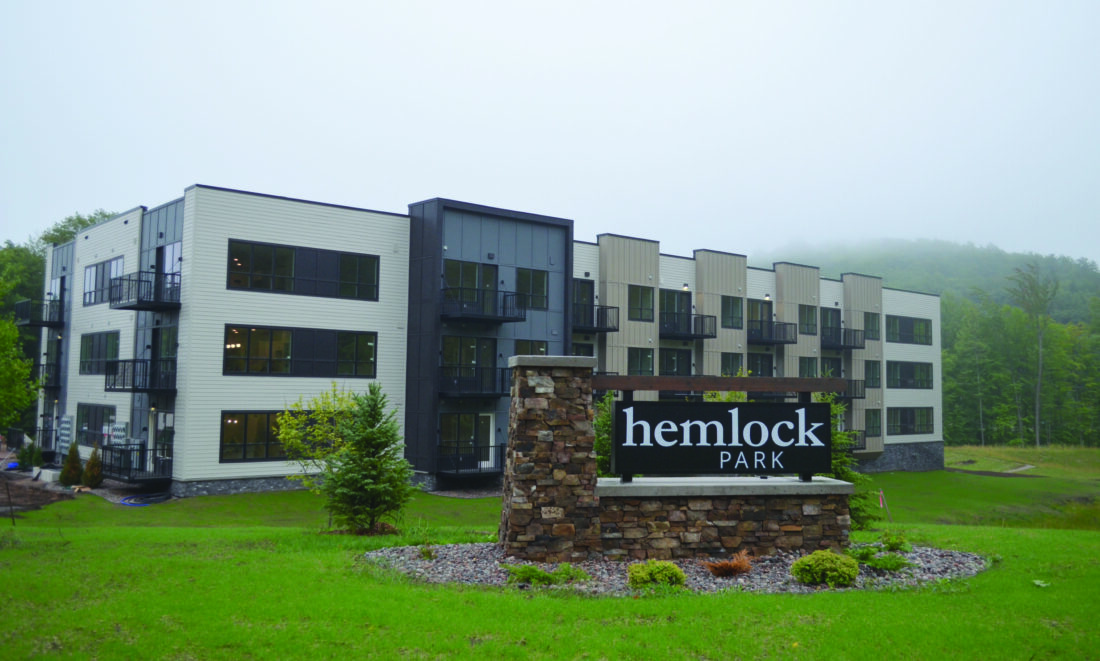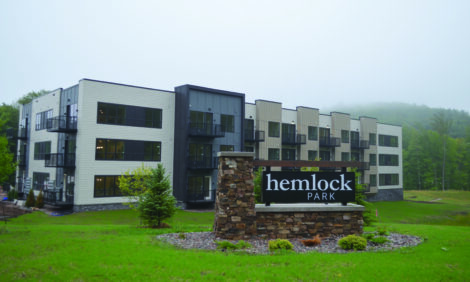Nonprofit uses tax money to fund ‘upscale’ U.P. apartments developed by its founder

The Freewheel Apartments at Hemlock Park, a new 39-unit “upscale” apartment complex on the outskirts of Marquette, got financial support from InvestUP, a not-for-profit economic development organization that received $15 million in state tax dollars to build “workforce” housing in the Upper Peninsula. (Journal photo by Abby LaForest)
By CRAIG MAUGER and BETH LeBLANC
The Detroit News
Michigan lawmakers awarded $15 million to a nonprofit organization to build housing for workers in the Upper Peninsula, but some of the money has benefited a project offering apartments that will cost as much as $2,900 a month and is led by a developer who helped to found the group.
As part of a $1 billion spending spree on grants in the state budget, the Legislature wrote 64 words in 2022 to direct an appropriation to InvestUP, a Marquette-based group that had formed five years earlier and never raised more than $1.5 million in a year.
A Detroit News investigation found that the flow of the earmark has contradicted the brief budget policy in two clear ways without intervention from Gov. Gretchen Whitmer’s administration.
Among them — according to the budget bill — the dollars were supposed to go to “workforce housing stock.” A separate state law sets financial parameters for what qualifies as “workforce housing.” At least one of the projects that InvestUP says the earmark is supporting, an apartment building at Hemlock Park in Marquette, falls outside the limits, according to the nonprofit’s own website.
That project, known as the Freewheel Apartments in Hemlock Park, is offering one-bedroom apartments that will cost $2,300 to $2,500 a month, while a two-bedroom rental there will be $2,900, according to the developer’s website, which describes the complex as a “39-unit upscale apartment community” that will open next month.
“That’s not workforce housing,” said Jessica Hanley, who is the mayor of Marquette, the most populous city in the Upper Peninsula.
The median household income in Marquette County is about $65,000 a year. A $2,900-a-month rental would devour more than half of that annual income.
While the Michigan Economic Development Corp. and InvestUP CEO Marty Fittante acknowledged one of the nine projects benefiting from the earmark fell outside traditional “workforce housing” parameters, they contended that those caps didn’t apply because they weren’t specifically cited by lawmakers in the budget language.
And Fittante said the project still met the mission behind the grant, which is “to bring ready and impactful housing” to the Upper Peninsula.
“This is arguably the biggest issue facing the region, especially in light of the challenge the region has around the aging of its population,” Fittante said.
The InvestUP CEO wouldn’t release specific information on how much of the taxpayer-funded grant was being spent on each housing project, but he said the expenditures were effectively loans that would be repaid by developers and then reinvested in other economic development projects.
Still, the handling of the Legislature’s grant to InvestUP has been unusual. It has involved a sponsor who’s a lawmaker from Midland — about 340 miles away from Marquette — a former staffer of the Michigan Legislature and a businessman who helped start InvestUP and whose developments are now being backed by the earmark.
The arrangement also raises new questions about the level of oversight the Whitmer administration is conducting for the $1 billion in grants that were embedded in the Fiscal Year 2023 state budget, amid a surge in state revenues.
Three of the grants have already spurred criminal investigations by the state’s Attorney General’s office, one set of charges and a raid of the Michigan Economic Development Corp. office in downtown Lansing.
Tracking the money
InvestUP formed as a Michigan business entity in 2017. A year later, the organization announced that Fittante, a longtime legislative staffer for then state Sen. Tom Casperson, R-Escanaba, would be the leader.
A housing developer named Robert Mahaney, who was InvestUP’s chairman at the time, touted Fittante’s hiring in a press release in 2018.
“InvestUP was formed around a bold vision: to deliver lasting economic, job and income growth across the U.P.,” Mahaney said. “With the addition of Marty Fittante, our ability to achieve this vision has grown immeasurably.”
Likewise, during a 2021 interview for the Michigan Economic Development Corp.’s own podcast, Fittante described Mahaney, the CEO of the Veridea Group, as the “impetus behind the organization.”
“He’s been at the helm since its inception,” Fittante said of Mahaney.
According to a tax filing, InvestUP had $1.1 million in revenue in 2022, the year the Legislature decided it should receive $15 million.
Then Senate Appropriations Committee Chairman Jim Stamas, R-Midland, sponsored the $15 million earmark, according to an application submitted to the State Budget Office. Stamas served with Casperson, Fittante’s former boss, in the Senate from 2015-18. Casperson died in 2020.
The application from InvestUP said the money would be spent on a cash collateral program to provide assistance to housing developments and a residential infrastructure loan fund.
“I know Marty well, but I don’t recall that specific allocation,” Stamas said when asked last week why he sponsored the grant.
When lawmakers allocated the $15 million for InvestUP in the summer of 2022, they described the organization in the budget as a nonprofit “that focuses on economic development, received tax-exempt status in 2018 and is located in a city with a population of between 20,500 and 20,640,” referring to Marquette.
Yet financial records for 2022 and 2023, filed with the Internal Revenue Service, don’t show the $15 million being received or spent by InvestUP.
Instead, the dollars went to a different nonprofit that was formed in 2023 — a year after the budget was approved — called Build UP. Build UP’s tax filing for 2023 acknowledged that the organization had received an initial $7 million of the $15 million.
While its application to the state didn’t mention Build UP, Fittante said InvestUP decided to create Build UP after getting advice from lawyers.
“While InvestUP could have administered the program directly, setting up the separate, subsidiary entity provided operational and reporting advantages, as well as protection against unrelated liabilities,” Fittante initially told The News.
Despite the specific language in the budget, the Michigan Economic Development Corp. “understood and approved the use of the wholly controlled subsidiary at the outset,” Fittante wrote of Build UP.
But James Hohman, director of fiscal policy at the free-market Mackinac Center for Public Policy in Midland, said the money should have gone directly to InvestUP, as the law specified, and not the separate organization. For it to go to a different group, lawmakers should have passed a new appropriation, he said.
“You can’t give that money to the new nonprofit,” Hohman said. “It has to go here. That’s the law.”
Potential conflict?
Danielle Emerson, spokeswoman for the Michigan Economic Development Corp., denied the idea that shifting which organization received the Legislature-directed money would make InvestUP out of compliance with the language in the budget.
Such an interpretation of the budget process would appear to give Whitmer administration officials broad leeway to change where earmarked money flows.
The reason the leaders of InvestUP wanted to send the dollars elsewhere was to “address real, or perceived, conflicts of interest with InvestUP board members,” Emerson acknowledged.
Emerson referred some questions about the details to Fittante, even though the Michigan Economic Development Corp. is supposed to be overseeing the grant.
The News investigation found that one of the conflicts is that Mahaney, a founder and board member of InvestUP, runs one of the largest housing development businesses in the Upper Peninsula, named Veridea Group.
Of the nine projects that Build UP said it has used the $15 million to support, the Veridea Group is responsible for two of them, including the Hemlock Park apartment complex that will offer $2,900-a-month two-bedroom apartments, according to the firm’s website.
Under the state’s normal definition of “workforce housing,” based on 120% of a county’s median income, the maximum monthly rent for a one-bedroom that would qualify in Marquette County is $1,963, while the maximum rent for a two-bedroom would be $2,355.
Fittante said Build UP has invested in 218 new housing units across the Upper Peninsula. About 30% of them, nearly one in three, are at Veridea Group developments, according to the organization’s website.
Mahaney didn’t directly answer a question about how much his firm had received through the Build UP program.
“I am proud of my role in forming InvestUP and all the good work it has accomplished,” Mahaney said in an email to The News. “You are patently wrong in suggesting that I or my firm have in some way gained advantage from my relationship with the organization.
“We finally have an effective U.P.-wide economic development organization that has brought tangible, meaningful results to our long-overlooked region.”
Another Veridea Group project that Build UP is supporting, according to its website, will construct 26 homes at the Hemlock Park development with an estimated sale price starting at $500,000, according to Build UP’s website.
Hanley, Marquette’s mayor, said she was unaware that the Hemlock Park projects in the city were intended for workforce housing. Hanley said Marquette needs more housing, specifically for people trying to work there but who can’t find a place to live.
The InvestUP deal is not the first time Mahaney has faced conflict-of-interest questions related to taxpayer funding and his business.
Mahaney’s involvement in the housing project comes a few years after former state Rep. Sara Cambensy, D-Marquette, raised concerns to Attorney General Dana Nessel about his involvement in a separate property that also received funding through a legislative earmark.
Shortly after the annual budget passed in 2022, Cambensy flagged a “potential conflict of interest” after $8 million was allocated for vacant building demolition at the site of a former hospital in Marquette.
Cambensy alleged the Northern Michigan University Foundation board, where Mahaney was an ex-officio member, had arranged a transfer of the property from the for-profit Lifepoint to Mahaney’s Veridea Group.
Nessel declined to investigate the matter, and the next year the Michigan Strategic Fund awarded another $8 million in Community Development Block Grant funds to help with cleanup at the site.
The NMU foundation began the sale of the former hospital site to Veridea Group for an appraised value of $2.5 million last September, according to Marquette’s WLUC-TV6. The sale is nearing completion, according to the foundation.
Following the money
Former state Rep. Jenn Hill, D-Marquette, said $2,900 a month for an apartment is simply not affordable.
Housing is the most important issue in Marquette, said Hill, who took office in 2023 and lost her reelection race in 2024.
“We still don’t have a plan on how to move forward,” Hill said of housing costs in Marquette. “I would like to help rectify that.”
A 2023 report from the city said Marquette “is in the middle of a housing crisis.” Housing construction had lagged because of location-based supply challenges and high costs, the report said.
“In recent years, rent has risen beyond what the average Marquette resident can afford,” the report said. “Simultaneously, demand for housing exceeds the existing supply, and new housing development has stalled.”
Build UP says its mission is to “address the Upper Peninsula’s immediate need for housing,” according to a filing with the Internal Revenue Service. Build UP’s president is David Nyberg, who previously served as deputy legal counsel and tribal governments liaison to Republican former Gov. Rick Snyder.
Nyberg didn’t respond to a request for comment.
Nyberg works at Northern Michigan University, where Mahaney previously served as a university trustee appointed by Snyder.
Build UP has used the earmark money to support a project to build 68 multifamily housing units in Crystal Falls and for a 40-unit complex called Rolling Meadows Apartments in south Marquette, according to the organization’s website.
Jim Conlin, founder of Ironshore Development, which is spearheading the Rolling Meadows complex, said the project received $1 million in support through Build UP.
“We’re local to Marquette,” Conlin said of his firm. “We see the need for housing.”
Rolling Meadows will offer two-bedroom, one-bathroom apartments with approximately 950 square feet each, and monthly rents are estimated at $2,150. That would put the project just under the workforce housing cap that’s been traditionally used by the state.
Similarly, Caleb VanTimmeren, co-owner of AV Rentals, said Build UP had helped make a project he’s working on to build two duplexes in Marquette possible.
“It’s been very positive working with them,” VanTimmeren said.
But he acknowledged that his project will produce rentals offered at affordable prices because the Michigan State Housing Development Authority was also involved in the financing. The agency, unlike a private nonprofit, like Build Up, has strict standards for the pricing of the government-subsidized housing.
There’s a huge need in the Upper Peninsula for houses that cost around $200,000 to $250,000, VanTimmeren said.
‘An exceptional group’
Republican lawmakers who currently represent the Upper Peninsula in the state Legislature have defended the $15 million grant to InvestUP and the nonprofit’s work in general.
“I think it’s an exceptional group,” said Sen. Ed McBroom, R-Vulcan, contending that InvestUP has focused on development in the Upper Peninsula in ways state agencies haven’t.
As for the money benefiting a complex offering apartments for $2,900 a month, McBroom said there’s a wide range of pricing needs in the region. McBroom said he viewed the use of a separate nonprofit as “a firewall that was set up.”
Asked if he would view it the same way if a similar situation occurred in Metro Detroit, instead of the Upper Peninsula, McBroom said he knows the people involved and they had been transparent in answering his questions.
While Build UP is a separate nonprofit, it uses the same address as InvestUP and its projects are included on the InvestUP website.
State Rep. Karl Bohnak, R-Deerton, told The News that he was aware that InvestUP had received a grant and that the organization had started another division called Build UP.
“That’s all I know about it,” Bohnak said.
While a Detroit News reporter was interviewing Bohnak on the floor of the Michigan House of Representatives, state Rep. Greg Markkanen, R-Hancock, approached and said Fittante was “highly respected” in the U.P.
Both Bohnak and Markkanen argued that $2,500-per-month rent was not out of place in Marquette.
“Construction costs are so astronomical now, even in Marquette,” Markkanen said. “Just because it’s in the U.P. doesn’t mean it’s cheaper.”




